Dreadnaught (1981)
Directed by: Yuen Woo-Ping
Written by: Wong Jing
Starring: Bryan Leung, Kwan Tak-Hing, Yuen Biao, Yuen Shun-Yee
AKA YONG ZHE WU JU
HONG KONG
RUNNING TIME: 95 mins
AVAILABLE ON BLU-RAY: NOW, from EUREKA ENTERTAINMENT
REVIEWED BY: Dr Lenera
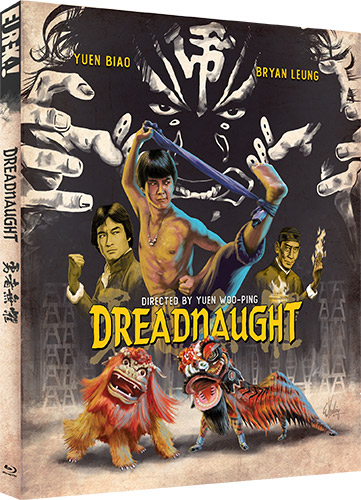
Violent criminal White Tiger is on the run with his sick wife. When she’s killed in a battle with police wearing a bell around her ankle, he becomes insane and will kill anyone who makes a bell-like sound, and heads for the home of ex-cohort Ned, who runs a kung fu school in opposition to local hero Wong Fei-Hung. Near there lives timid Mousy who runs a laundry service with his rather tougher sister and who’s constantly being taken advantage of. He has a friend called Leung Foon who’s not just a good martial artist but is Wong’s top pupil, but he’s not brave enough to ask Wong to train him. And unfortunately Mousy, who can’t fight at all, happens a lucky bell around his neck, just the thing to set off the murderous White Tiger….
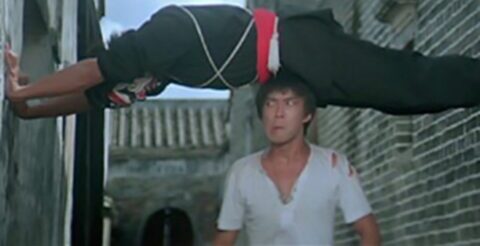
So three days after my review of Dreadnaught, we have my writeup of the Yuen Baio’s second starrer, that Eureka Entertainment are releasing today, and I’d never seen it before, so wasn’t really prepared for how unusual it is, at least compared to the many other comedy kung fu films that were flooding the marketplace at the time, and which was what the Chinese public, tired of oh-so-serious martial arts movies, were lapping up. Of course we have agile fighting, goofy slapstick and much combining of the two in a film which bares a slight resemblance to The Young Master which hadn’t long continued Jackie Chan’s recent rule at the box office which had began with the incredibly influential and hugely copied Snake In The Eagle’s Shadow and its semi-remake, the even more popular Drunken Master. But we also have much more playing with the typical story elements; for example there’s no real training sequence, just a few small bits where our hero is picking up bits and pieces even if he doesn’t always know it. There are passages of strong suspense, even horror, as the monstrous villain is a genuinely frightening utter maniac who pursues the terrified Mousy all over the place and kills others in brutal ways. There’s even a police element, though it’s played mostly for laughs. Perhaps most strikingly, and probably the main reason why this film doesn’t seem to be as popular with fans as it probably should be considering how entertaining and exciting it is, Biao’s character is a total coward and remains one until over three quarters of the film has taken place. In fact I had some trouble linking the fearless hero in the climax with the wimp that I’d previously been watching, and a wimp who’s not just a wimp in fighting. But there are also some magical highlights, this film taking place in a world where virtually everything can be an excuse for some kung-fu expertise, be it doing the washing [look out for a bit stolen for Batman Forever], tailoring or healing somebody. The full-on combat being relegated to the beginning and the end is hardly a problem.
The unmistakable notes of the Wong Fei-Hung Theme [not actually written for him but associated with the legendary character] begin the film, in a somewhat unusual arrangement which soon goes into quick 3/4 time and will be heard throughout. The music and the titles play over shots of a man pushing a woman on a cart through very uneven countryside. We immediately feel sympathetic to the two, though when the man enters a teahouse he kicks across his table the man sitting nearest to him, while it’s his wife who taunts the people there who are revealed to all be policemen out to ambush this dangerous villain White Tiger. A fight ensures where the lady is lethal with a dagger, but is still slain even though her husband quickly kills the rest; he then jumps through a window carrying her body. We still can’t help but feel some compassion for him and understand him going totally bananas, even though we may soon forget this. Now we meet Mousy ]Mook Geung in the Cantonese dub] going off to collect payment for cleaning people’s laundry, but getting snubbed and picked on and returning home with no money but more laundry, to the despair of his [unnamed] sister. He jumps at the slightest sound, avoids any confrontation, and won’t even chat up the girl he likes. At least he has a friend Leung Foon [a real student of Wong also portrayed in other films including by Biao] who’s the opposite to him and is even being taught by Wong. White Tiger turns up at Fong’s school but Tam suggests that he hide out among the local opera troupe, but first of all he visits Wong as patient, the learned doctor curing his wounds with what I suppose could be called Medical Kung Fu in an indescribably cool scene. Foon features in the annual Lion Dance between two schools, Wong’s and one by Tam King [Philip Ko as a villain again] who wants to get rid of the other. Wong has to intervene to save the day and Tam nearly gets burnt alive.
The setup is given just the right amount of time. White Tiger finds his hiding place but when he gets angry he kills, viciously slaying his first victim using first strangulation, then stabbing with a pointed stick in the heart as if he was a vampire, then slashing his neck with broken glass. We don’t see graphic detail but the ferocity of the killing is still startling. When he first encounters Mousy, we’re feel really worried that, when Mousy is chased by him and he hides in a laundry tub, he may be caught, so well is the tension managed here in what is overall a directorial showcase for Yuen Woo-Ping who shows himself to be very proficient at several kinds of cinema in just one film. He’s even able to mix fear and laughs successfully in the same scene, like when Mousy thinks he’s got away from White Tiger and asks a man for help, a man who’s actually White Tiger but one side of his face is without makeup. Foon decides to make Mousy into a man in comic scenarios which tend to go wrong, notably when he tells someone that Mousy is actually Wong Fei-Hung, just to provoke Mousy into standing up for himself and doing some fighting, but which results in the police searching for Wong. These farcical situations may not usually be believable – surely the majority of people in this town would have some idea of Wong’s real age? – but they do contribute to and merge well with the general narrative. Those who found much of the comedy in Knockabout to be pointless and too prevalent may not feel the same way here, and the theme of a weak person finding his courage is always one that works, though here we come close to swearing at Mousy to sort himself out. Wong won’t teach him, but could he have been learning some stuff from his sister [Lili Li from The Young Master] – who like to play around with the laundry – and his friend all the time? Of course we can predict what certain event will finally get him going, though I wasn’t quite entirely convinced by his transformation.
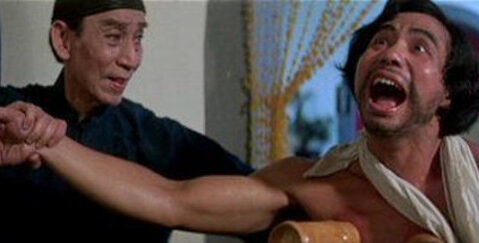
After the fairly short fight involving White Tiger and his wife, and the Medical Kung Fu, the first major action scene is the lion dance which gives the one in The Young Master a run for its money. Here, they have to traverse upside down training benches and the only way they can do this is lift up other benches and put them on top but the right way up. After this, for a lot of the time much of the kung fu involves people hitting and kicking each other in a humorous fashion and even by mistake or thinking it’s from somebody else, or doing other things in a martial arts fashion. Foon pretends to be White Tiger so that Mousy can pretend to beat him up and therefore impress his lady friend, but his strikes are too hard because of his inexperience, and then guess who turns up? Mousy eventually confronts a corrupt Superintendent, but it’s Foon who does most of the work. Such moments are so well done we aren’t too bothered by the lack of full-on combat, though there’s a bit of good three-sectioned staff wielding. Wong gets many of the best scenes; he’s even attacked by an assassin disguised as a tailor [nice cameo by Fung Hark-On] in a scene we may as well as Tailor Kung Fu. Wong is played by Kwan Tak-Hing in what was his final performance in the role, a role he played a whopping 77 times, usually though not entirely in a series of Wong Fei-Hung films that ran between 1949 and 1970. He’s 70 here and is therefore obviously doubled, but still does a lot of moves and exudes the authority, not to mention a lovely glint in his eye, to sell the idea that Wong is still so skillful. We’re almost disappointed when, even though he gets to fight Ko, he steps aside so that Baio can finally go up against Yuen Shun-yee properly in a vicious, frantic battle set in the upstairs floor of a theatre, making much use of the environment Chan-style and a few tricks from Yuen, making up for the fact he’s not particularly skilled.
Said theatre is also the setting of the most uncanny scene, one that features White Tiger disguised as a ghost, merged to a puppet with a white mask to his black. There’s a bit of slasher-style subjective camerawork and even a slight “cha-cha-cha” heard on the soundtrack. You’d expect such things to jar with the silly aspects, but they generally don’t. In fact this film might sound like an utter mess from what I’ve written, though it’s not at all, even though Biao’s love interest [played by Yuen Qia who, while I’ve known her from other films, I’ve only just realised is one of Hip’s kung fu nieces in The Man With The Golden Gun!] disappears from the screen and isn’t even around at the end. The most comical character is Superintendent Pao, who sees White Tiger’s first victim, who has a stick impaled in him though is covered by a sheet, and says, “look at that, it’s too much sex”. He thinks he’s a genius but is actually stupid, not to mention a visitor of brothels, and has a cross-eyed assistant whom he keeps hitting yet who still fawns over him. Seeing as I like this type of humour, I was kept chuckling, and Fan Mei-sheng proves that he can fight too; the keen eyed will be able to tell that he’s not a trained martial artist, but can clearly mimic well, much like Bryan “Beardy” Leung who unusually appears without a beard but retains his chemistry with Baio from Knockabout. As for Baio, the nature of his role means that he has to hold back in terms of what he can do, as well as go very broad with exaggerated mannerisms in displaying fear, weakness and clumsiness. But he’s still quite likable despite, as I’ve said more than once elsewhere, not really possessing a great screen presence.
The screenplay credited to Wong Jing [the man later to be dubbed “the Roger Corman of Hong Kong”] but it seems that he only wrote the story which was then developed bv a team. Yuen Woo-Ping seems to have taken the opportunity here to stretch himself, though he’s generally proved to be one of the most technically advanced of Hong Kong directors, which makes it unsurprising that he went on to have a good career, if not as director, in Hollywood. The opening sequence in particular features quite elaborate use of closeups and quick cuts, and then there’s a great moment where lots of people crowding round a dead body in a tea house transitions into just two people in the same surroundings. The music score is credited to Frankie Chan, but unlike in Knockabout, he seems to have written original music, this being made around the time when things were changing in the industry regarding soundtracks to films. Chan’s stuff fits the images okay but isn’t memorable. But Dreadnaught is generally both very interesting and infinitely smoother than it probably ought to be. Unless you absolutely craze acres of fighting you should find a pretty satisfying viewing experience. Fans will be pleased that a shot that was previously cut in the UK of White Tiger biting the head off a chicken has been restored. I assumed that research proved the chicken to be fake or the head to have already been removed for some reason.
Rating: 









SPECIAL FEATURES
Limited Edition O-Card slipcase featuring new artwork by Darren Wheeling [2000 copies]
Reversible sleeve design featuring original poster artwork
Film presented in 1080p on Blu-ray from a 2K restoration
Dreadnaught looks just as good as Knockabout; the colours are more diverse though the reds still jump out at you. The odd very soft shot seems to be more a case of being out of focus rather than weaknesses in the restoration.
Original Cantonese mono audio
Optional English dubbed audio
Done around the time the English dubs were starting to lose their flavour, this one is still a decent effort. As usual I switched over to the Cantonese track a few times and noticed an extra music cue near the end, that’s actually part of a track from Miklos Rozsa’s score to Time After Time, so there are probably a few other differences, though not many as that was the only one I picked up.
Optional English Subtitles, newly translated for this release
Brand new feature length audio commentary by Asian film experts Frank Djeng [NY Asian Film Festival] and Michael Worth
I thought this track was superior to the Djeng and Worth track on Knockabout, possibly because this film is more different and therefore there’s more to talk about. An especially useful section is during the lion dance when Djeng explains as to why the annual lion dances takes place and what’s the aim is, while we also learn that the “cupping” with fire that Wong does is a genuine medical treatment. Djeng thinks that the Tailor Kung Fu scene is superior to the calligraphy scene in Magnificent Butcher, while Worth tells us that Joel Schumacher admitted to him about re-using that laundry scene in Batman Forever; even many of the shots are the same. Djeng also points out a lot of things like a joke which the subtitles considerably weaken because a word used is different.
Brand new feature length audio commentary by action cinema experts Mike Leeder & Arne Venema
As usual, these two provide the light hearted opposite to the above [not to say that Djeng and Worth are at all heavy going], and we learn all sorts of vaguely connected things about the two such as Leeder having lived in Croydon where they shot Killer’s Romance though had moved to Hong Kong a week before they started shooting there, plus odd facts that you’ll remember like Kwan Tak-Hing being in condom commercials. Leeder thinks that Baio lost heart after the big commercial failure of The Kid From Tibet in 1990, while Venema gives away the twist of Malignant without thinking!
Archival interview with actress Lily Li [21 mins]
This Hong Kong Legends interview from the DVD, thankfully made when they weren’t having low-key techno in the background, sees Li go through her early career. She praises Shaw Brothers for being “artistically serious” and their attention to detail, describes how her Skirt Kung Fu was executed in The Young Master, and says that she wasn’t given a script on Dreadnaught, just pages. I’m not surprised.
Trailers
A Limited Edition collector’s booklet featuring new writing by James Oliver [2000 copies]
‘Dreadnaught’ is a good example of how Hong Kong filmmakers in the Golden Age could create a film that probably shouldn’t hang together at all but which somehow comes together quite satisfyingly. While there were less extras than usual to port over, Eureka have still given it a release that does it justice. Highly Recommended.


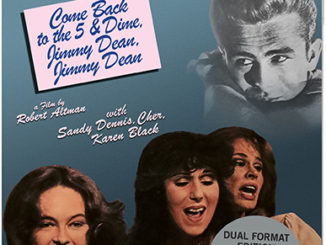
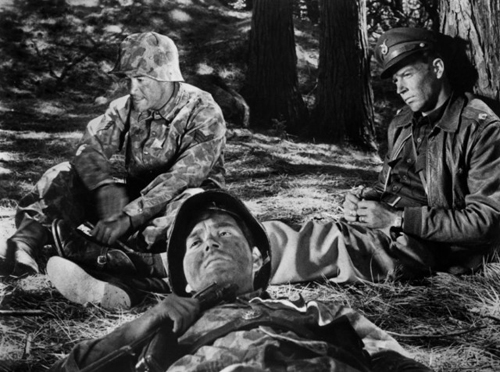
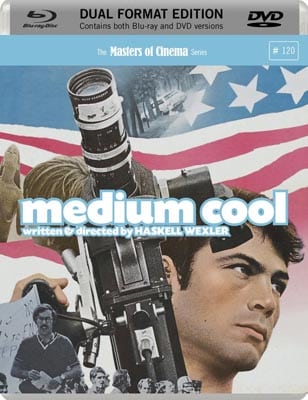
Be the first to comment